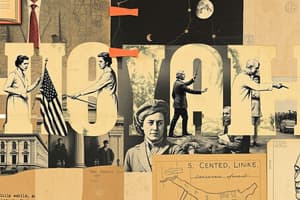Podcast
Questions and Answers
What does the Greek word 'historia' mean?
What does the Greek word 'historia' mean?
- Knowledge acquired through investigation (correct)
- Ancient texts
- Study of natural phenomena
- Recording of important dates
According to traditional historians, what was the mantra they lived by?
According to traditional historians, what was the mantra they lived by?
- History is subjective
- Facts not required for history
- Only written sources are valid
- No document, no history (correct)
What did historians start using as historical sources due to the limitation of written documents?
What did historians start using as historical sources due to the limitation of written documents?
- Fiction books
- Oral traditions and artifacts (correct)
- Newspapers and magazines
- Paintings and sculptures
In addition to dates and events, what else does the study of history involve?
In addition to dates and events, what else does the study of history involve?
What is the main focus of traditional historians' writings?
What is the main focus of traditional historians' writings?
What does the phrase 'no document, no history' suggest about historical events?
What does the phrase 'no document, no history' suggest about historical events?
What is the primary objective of history according to the text?
What is the primary objective of history according to the text?
Which of the following is NOT considered a primary source in historical research?
Which of the following is NOT considered a primary source in historical research?
Why is external criticism important in historical analysis?
Why is external criticism important in historical analysis?
Which type of sources are produced by authors using primary sources to study historical subjects?
Which type of sources are produced by authors using primary sources to study historical subjects?
What is the main purpose of studying history according to the text?
What is the main purpose of studying history according to the text?
Why does good history correct misleading analogies and 'lessons' from the past?
Why does good history correct misleading analogies and 'lessons' from the past?
Flashcards are hidden until you start studying




